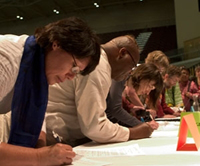More than 80 million Reformed Christians in 108 countries around the world formally united Friday when the World Alliance of Reformed Churches (WARC) and the Reformed Ecumenical Council (REC) approved articles of union and a constitution bringing them together as the World Communion of Reformed Churches (WCRC).
The merger of the two organizations took place at the Uniting General Council, which is meeting through June 28 at Calvin College in Grand Rapids, Mich.
Although the long-awaited merger went through, afternoon discussion on passage of a constitution and bylaws grew lively and took longer than planned over the issue of representation of women on committees and in leadership positions in the new body.
“We had a very vigorous and intense conversation. It may have taken us longer than we thought it would,” but God remained with delegates and the Holy Spirit helped to guide the discussion, said Clifton Kirkpatrick, president of WARC who chaired the discussions for his organization that led to the formation of the WCRC.
By late afternoon, the two separate ecumenical bodies became one. Afterward, delegates gathered around tables to sign the documents passed by the assembly.
REC was represented by 79 delegates from 28 of its member churches. WARC had 301 delegates from 132 member churches present.
Kirkpatrick noted that 73 participants, including 46 delegates, were denied visas to attend the event by the US government.
“We need to acknowledge the deep pain we feel about the absence of these brothers and sisters,” he said.
The daylong series of events included separate meetings of the REC and WARC, an opening worship service, recognitions of several leaders who have been instrumental in the unification process, an exchange of greetings and gifts between WCRC officials and Native American leaders and a gala reception celebrating the union.
The articles of union affirm “that such an act of union is implemented not only in order to carry out the major aims for which both organizations have existed separately, but also in order to respond to God’s call for service in the church and the world.”
The 64-year-old REC — with 41 member churches in 25 countries representing 12 million members — approved the union unanimously with no debate.
It was a different story with WARC, which dates back to 1875 and numbers 214 member churches in 107 countries representing 75 million members. The intense discussion over representation by women was led by delegates seeking assurance that the organization’s commitments to racial and women’s justice will go forward.
Speaking for the Pre-Assembly Women’s Conference, the Rev. Dora Arce-Valentin of the Presbyterian Reformed Church in Cuba, said, “During these past years we have seen many advances in the role and status of women — we must not retreat.”
Those underlying tensions rose again during consideration of the draft constitution Friday afternoon. After more than 90 minutes of debate, the group amended the document to provide that “when a church sends four or more delegates (to General Council meetings), half shall be women.” The drafting committee’s recommendation was one-third women.
In a related action designed to ensure the participation of youth, the group increased from two to three the number of delegates accorded to churches with less than 100,000 members. Larger delegations were already mandated to include at least one delegate 30 years of age or younger.
Some delegates expressed hope that the new organization would make sure to show sensitivity to its member churches as it moves forward.
Charity Majiza, of the Uniting Church in Australia, referred to the suspension of three South African churches. In 1972 WARC declared apartheid a sin and those churches that supported it heretical. She sought assurance that WCRC would address the “woundedness in our separation and not gloss over it.”
Kirkpatrick responded that racial justice is “a bedrock commitment” that will go forward, noting that the REC has committed to support of the Accra Confession: Covenanting for Justice in the Economy and the Earth, adopted by WARC in 2004 that reaffirms its commitment to global economic and climate justice.
Peter Borgdorff, president of REC, called the day’s events a “construction zone,” proof that God is using all Reformed Christians to “build a new spiritual house for God.”
Kirkpatrick said, “I do believe it is God’s intention that we live together in unity and I thank God for this momentous day, in which we are not just called to be more cooperative, but to be one in Jesus Christ.”
Jerry Van Marter is serving as English-language reporter for the Uniting General Council of the World Communion of Reformed Churches, June 18-26. For complete coverage of the meeting, visit the web site.

